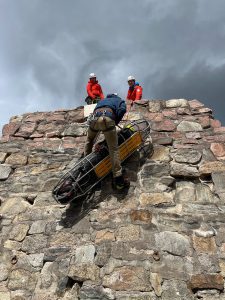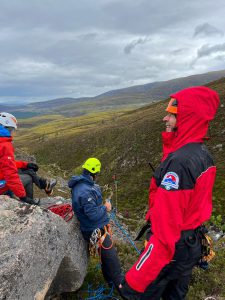On the invaluable Scottish Mountain Rescue courses

On the invaluable Scottish Mountain Rescue courses
From the Hebrides Mountain Rescue Team by Simon Divecha. Photos by Isi Oakley
Mountain rescue. We have a saying many are familiar with—hurry up and wait 🙂
• Hurry when we get the call.
• Act swiftly but plan carefully and purposefully, with a lot of standing around, when we get to an incident.
• Do a lot of waiting in between calls!
When anyone is waiting we all get rusty. Rig a highline? Alpine butterfly? What end of the jag system was I putting where on the stretcher… etc. In our other lives, outside of Mountain Rescue, we don’t use this that much.
Queue the invaluable Scottish Mountain Rescue (SMR) National Training programs. The pictures illustrating this story are from the SMR Advanced Rigging course in the Cairngorms in August 2022. It, and others like it, are concentred dives into rescue techniques.

Like many volunteers within rescue I’m motivated by helping, by the community, by the usefulness—including lifesaving potential—of this service and usefully harnessing my skills for our world’s benefit. While I’m a skier and mountaineer/climber, none of these are my day job (I’m a coach and large scale/organisational change consultant). I regularly write and talk. I do not regularly scoop someone into a stretcher, off a crag, who’s potentially in suspension trauma.
This skill and practice gap, the differences between my outdoor passions and Mountain Rescue techniques, are my main motivation for attending the SMR courses. On the courses we share knowledge, learn from the instructors who use and apply these rescue systems on a far more regular basis—in real life and through training. And we have fun! While my team, Hebrides Mountain Rescue Team (HebMRT), is clearly filled with the most interesting people across Scotland (weel these are the outer isles, forgive a little bit of parochialism please) it is invaluable to meet so many other teams and members on these courses.
There’s a sharing of ideas, lots of ribbing each other and some great assistance from the deep experience of others on the courses too. It’s obvious in some ways but our hills and mountains are different. We are likely to encounter some similar circumstances on rescues across Scotland and some fairly unique regional ones. That’s where these courses are really useful too. In the more standard scenarios we get to practice—learn through repetition and in situations when there’s plenty of help during the courses and those skills are more regularly used on callouts. If we encounter something more unique, out here in the Isles, the training and help from all the advanced rescue participants as well as instructors stands to benefit everyone.
If you are thinking about an advanced rigging course you’ll cover things like:
• Crag rescue for someone who’s got stuck and does not have a harness on.
• Rescue from a cliff of a climber in a harness and getting them safely out of their rope system.
• Scooping someone into a stretcher from a crag.
• A highline to get a casualty over broken or rocky terrain that is otherwise tough to traverse.
• And a significant amount of discussion and consideration of viable alternatives for each of these situations.
• Plus, practice!

Critically, we and I want to remember this a year later. For myself and HebMRT there be quite a few ways of sharing the skills from the advanced rescue course. For example, we’ll look at a couple of sites where a highline might be useful (those are limited in these Isles). Then we’ll look to plan and conduct an onsite training with our team. And, look to repeat similar pieces in the future.
Consequently, if you’re thinking about going on an SMR course, do it! If you’re a funder for one of these courses, thank you for the invaluable assistance. And, especially, a large thanks to our instructors too: Andy Ravenhill, Jon Sanders and Kirsty Pallas and all at SMR who make these courses possible.
Dr Simon Divecha is co-founder of (be) Benevolution https://be-benevolution.com and faculty for Pacific Integral https://www.pacificintegral.com. Isi Oakley runs Climb Hebrides https://www.climbhebrides.co.uk. Both are Hebrides MRT volunteers.